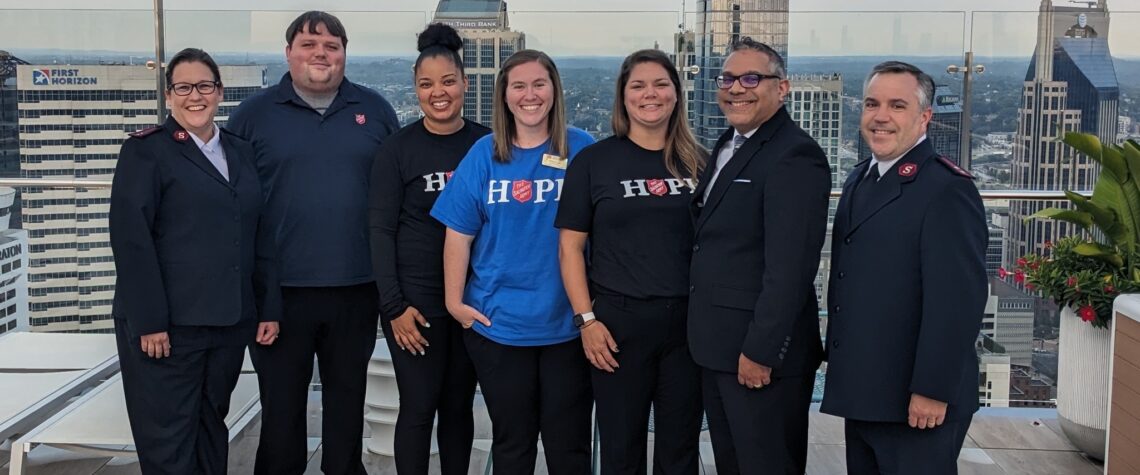The Salvation Army’s Captains Philip and Elaine Canning are committed to leading Nashville forward in addressing homelessness
On a warm June day in 2022, Captains Philip and Elaine Canning arrived in Nashville to become the leaders of the Nashville area command of The Salvation Army. Inspired by the good news of the gospel of Jesus Christ, the Cannings are leading this beloved Nashville institution into the future with grace and intention.
A Calling for the Cannings
Working for The Salvation Army isn’t really a job in the traditional sense. It’s a calling. The Cannings can’t imagine their lives without being a part of The Salvation Army. Their souls have been shaped by the organization and its ministry to help others.
Both Cannings grew up in The Salvation Army. Their families have been part of “the Army” for generations. They’ve raised their own children in it. Both Philip and Elaine worked as regular employees for The Salvation Army before receiving the call to become officers. Capt. Philip worked as Operations Director at the Atlanta Temple Corps, while Capt. Elaine was the editor of The Salvation Army’s Disposition of Forces.
When they realized that God and The Salvation Army had even bigger plans for them, the Cannings embraced the call, which required going to The Salvation Army Officers Training College in Atlanta, GA.
Prior to coming to Nashville, Capts. Philip and Elaine served as officers in The Salvation Army in Georgia for several years. First, they were the Area Commanders of the Augusta Area Command and Kroc Center in Augusta, Georgia. Then they received a call to move to Atlanta to serve at the Georgia Divisional Headquarters as Divisional Secretary and Divisional Secretary of Programs.
Now they serve as Area Commanders (co-executive directors) of the Nashville Area Command.
So, yes, it’s a job. But being a part of The Salvation Army is so much more for the Cannings. The Salvation Army is also their church home and their mission. And it’s a blessing.
A Vision for Nashville
When the Cannings learned that The Salvation Army was sending them to Nashville, they were excited. The Salvation Army is a well-respected organization in the greater Nashville community, with deep roots.
Majors Ethan and Sue Frizzell, who were the Nashville area command’s previous leaders, had left the command in good stead. The organization was known and respected for its innovations, as well as its good working relationship with the city of Nashville.
The message from God about his vision for Nashville was clear.
“The word that God placed on my heart is ‘community,’” Capt. Philip said.
The word “community” means a group who share something in common. If you’ve ever heard the slogan, “We are Nashville,” you’ll remember how the city pulled together after the flood of May 2010 and then again after the tornado of March 2020. The city of Nashville prides itself on taking the concept of community seriously, and the Cannings see that mindset as a great opportunity to help those in need of help and hope.
As a result, collaboration is paramount for The Salvation Army. Capt. Philip emphasizes that the Nashville Area Command doesn’t do anything in isolation. Collaboration with civic and community leaders, other nonprofit organizations and private institutions is necessary to the success of any program in the long term—hence, the Nashville Area command’s relationships with the Metro Nashville Government, United Way of Greater Nashville, and Second Harvest Food Bank of Middle Tennessee and others, all with the goal to bring hope to Nashville’s most vulnerable citizens.
Plus, The Salvation Army’s own community of staffers and volunteers are passionate about helping vulnerable people. They have the support of a robust and diverse group of community leaders who serve on the organization’s advisory board.
The team effort includes ordinary citizens, as well. Consider the Red Kettles, the iconic image of The Salvation Army during the Christmas season. When anyone stops to chat with a volunteer bellringer and puts a donation in the kettle, they’re helping, too. All those donations go back to fund programs that help those facing challenges in the Nashville community.
“The reality is that what makes Nashville Nashville is its people,” Capt. Philip said. “And its people are everyone, from the wealthiest and the most influential to the individual who is experiencing homelessness and is standing out there on the street corner asking people for money to help get them through the day.”
“We’re all in this together,” he continued. “And we have to work together: the government, the social service sector, individuals, community groups, companies, the private sector. All of us have to work together to address barriers in our community so that everybody has a chance to get ahead.”
Innovation and Collaboration
Homelessness is a systemic problem. It doesn’t discriminate, Capt. Philip notes, and people regularly fall through the cracks. The vast majority of those living without shelter are not there by choice, even if they resist initial efforts to help them find housing.
“But it’s important for us to realize that what they’re saying is, ‘I don’t know how to navigate another world, and it scares me. I’d rather stick with what I know,’” he said.
That’s where The Salvation Army’s LIFNAV program comes in. LIFNAV is the organization’s innovative approach to helping people experiencing homelessness find their way to a stable, long-term housing situation. You can immediately see evidence of the importance of community in the LIFNAV program. LIFNAV, which is guided by the mantra “Engage. Empower. Equip.,” is based on forming relationships with people and developing trust.
Indeed, trust makes it all possible. Relationships make LIFNAV work. And that was the type of innovation that drew the Cannings to Nashville. The emphasis on relationships resonates deeply with both of them.
Here’s how it works. First, the LIFNAV outreach team goes out into the community, into encampments to make initial contacts with people who are experiencing homelessness. The team members break bread and share food with the people they’re hoping to reach. Over time and dinner, they get to know them. Then they can assess whether those people are ready to take the next step, which is to move out of the camp or off the street into temporary housing, known as gap housing or rapid re-housing.
LIFNAV case managers then help those individuals tackle the logistics, such as making sure they have the right documentation to take the next step to obtain permanent housing. They help them with life skills and provide other support, even after they move into their new home.
Even while they deal with small, often tedious details, the LIFNAV team members never lose sight of the fact that each individual is a child of God, with their own hopes and dreams.
“It’s a respectful process,” Capt. Elaine Canning explained. “The LIFNAV outreach team brings dignity to the process. They take time to find out about these individuals’ lives and how they’ve experienced homelessness and what has brought them to the situation they’re in, as well as where they’d like to see themselves.”
And while there are nearly 2,000 people living in Nashville who are experiencing homelessness, the Cannings are confident that The Salvation Army, together with the community of Nashville, can reach them and help them not only find housing but regain a sense of hope.
“We’re going to work with them as long as it takes to find housing,” Capt. Philip said. “That’s our goal—to build a trusting relationship.”
The LIFNAV program has already experienced notable success—success that all the donors who support the program can be proud of. According to the Metro Office of Homeless Services, since 2021 when the partnership between the LIFNAV program and city started, 87% of those who have moved into permanent housing have remained in permanent housing a year later.
The Cannings are also proud of The Salvation Army’s other initiatives. While LIFNAV and the Center of Hope Supportive Housing Program help people move out of homelessness, other programs are designed to prevent homelessness from occurring in the first place.
One of The Salvation Army’s homelessness prevention programs is the Pathway of Hope, a case management program designed to help families set goals and overcome barriers en route to achieving those goals. Another homelessness prevention initiative is the Emergency Financial and Food Assistance program, which provides resources to help families remain in their homes and stabilize their households.
The Salvation Army also oversees programming that reaches out to children and teens who are at risk for becoming homeless.
Where God is at Work
You could see how it would be easy to get lost in the nitty-gritty details, the logistics of meeting people’s needs. But the Cannings and their team never lose sight of The Salvation Army’s mission, which promises, “Its ministry is motivated by the love of God. Its mission is to preach the gospel of Jesus Christ and to meet human needs in His name without discrimination.”
The mission guides everything that the Cannings and the rest of The Salvation Army team do. They carry it out every day: every staff member, every team member, every volunteer for The Salvation Army’s mission.
“They’re the hands and feet of Christ, extending compassion and generosity,” Capt. Elaine said.
She also sees God in the face of every person who is experiencing homelessness.
“I see a chance to remind them that they are valued by God. They are his creation, that he has a plan for their lives, just as for any other individual,” she said. “There is dignity in that.”
Homelessness is a dehumanizing experience, so all the programs are designed to center the person experiencing it.
“When we’re dealing with homelessness, we’re dealing with humans,” Capt. Philip said. And that remains at the core of The Salvation Army’s work.
“God is in the redemption business, and he’s redeeming lives physically and spiritually,” he added. “You see God at work in the results of changed lives.”
The Future
As 2024 approaches, the Cannings are optimistic about what the future holds for Nashville.
“The future for Nashville is bright. All the right things are happening,” Capt. Philip said. “The city is growing. We’re attracting new business and new opportunities, which is great for the city.
“The future is also bright because the conversation around homelessness is happening. The right conversations are occurring, and we’re addressing this in a new way,” he added.
It will take time to address homelessness, of course, and as with any journey, there will likely be a few bumps in the road along the way.
“But the important thing is that we’re heading in the right direction. And it’s going to take all of us,” Philip said. “We’re all in this together, and we all have a role to play in continuing to make Nashville a great place for everyone to thrive—and by everyone, I mean everyone.”
As the city grows, and those new businesses arrive and establish a foothold, it’s important to remember the people who live without shelter, on the margins of society. There’s an old adage that a rising tide raises all ships, and the Cannings believe it will be true for Nashville, if everyone pulls together.
Says Capt. Philip: “Let’s work together to make that happen.”
Jennifer Larson














